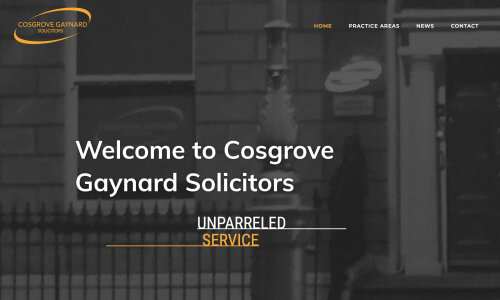Best Corporate Governance Lawyers in Dublin
Share your needs with us, get contacted by law firms.
Free. Takes 2 min.
List of the best lawyers in Dublin, Ireland
About Corporate Governance Law in Dublin, Ireland
Corporate governance refers to the system of rules, practices, and processes by which companies are directed and controlled. In Dublin, Ireland, corporate governance is essential for ensuring transparency, accountability, and the ethical running of businesses of all sizes. The legal framework for corporate governance is designed to foster confidence among investors, employees, and the general public. This framework encompasses legislation, standards, and codes of practice that establish how company boards and management operate, including their responsibilities and duties to shareholders and stakeholders.
Why You May Need a Lawyer
Legal expertise in corporate governance is necessary for a variety of situations, whether you are establishing a new company, restructuring an existing one, or addressing compliance matters. Common scenarios where individuals and businesses seek legal assistance include:
- Drafting or reviewing governance policies and company constitutions
- Ensuring compliance with the Companies Act 2014 and other regulatory requirements
- Advising on directors' duties, conflicts of interest, and fiduciary responsibilities
- Assisting with board and shareholder disputes
- Guiding on best practices for board composition, meetings, and decision-making
- Providing advice on regulated industries or publicly listed companies
- Dealing with whistleblowing or ethical concerns within a company
Engaging an experienced lawyer early can help prevent issues, reduce risk, and ensure your business is meeting its obligations under Irish law.
Local Laws Overview
Corporate governance in Dublin is fundamentally shaped by the Companies Act 2014, which consolidates and updates all previous company law in Ireland. This legislation outlines the legal obligations of company directors and officers, sets out procedures for meetings, records, financial disclosures, and provides remedies for minority shareholders. Other relevant frameworks include the Central Bank of Ireland's codes for financial institutions, the Irish Corporate Governance Annex for listed companies, and guidance from the Office of the Director of Corporate Enforcement (ODCE).
Key aspects of governance law include:
- Director responsibilities and disqualification rules
- Rules regarding board structure, board meetings, and directors' meetings
- Mandatory company records and filings
- Audit, risk management, and internal control requirements
- Disclosure and transparency obligations for public companies
- Provisions addressing conflicts of interest, insider dealing, and shareholder rights
Frequently Asked Questions
What is corporate governance and why is it important in Dublin, Ireland?
Corporate governance is the system by which companies are directed and controlled. In Dublin, strong governance is key to maintaining investor confidence, promoting accountability, and ensuring compliance with Irish and EU regulations.
Who is responsible for corporate governance in a company?
The board of directors holds primary responsibility for corporate governance, with oversight duties shared by company officers and, in some cases, committees such as audit or remuneration committees.
What are the main corporate governance laws in Ireland?
The Companies Act 2014 is the primary legislation guiding corporate governance. Additional regulations may apply depending on the industry, such as financial services, and to public companies listed on Euronext Dublin.
What duties do directors have under Irish law?
Directors must act in the best interests of the company, avoid conflicts of interest, comply with statutory duties, maintain proper records, and ensure that the company complies with all legal obligations.
What happens if a company fails to comply with governance laws?
Failing to comply can result in investigations, fines, director disqualification, or even criminal prosecution. Shareholders and stakeholders may also take civil action against the company or its officers.
Are there specific governance requirements for start-ups and SMEs?
All Irish companies, regardless of size, must comply with the Companies Act. However, some requirements such as audit obligations are relaxed for small companies, but basic governance standards still apply.
How often must Irish companies hold board meetings?
There is no legal minimum, but regular board meetings are expected to ensure proper oversight and compliance. The company's constitution may specify frequency and notice requirements.
Can non-residents act as directors of Irish companies?
Yes, but at least one director must be resident in the European Economic Area or, alternatively, the company must hold a Section 137 non-resident director bond.
What rights do shareholders have under Irish corporate governance law?
Shareholders have rights to receive information, attend and vote at general meetings, approve major decisions, and take action against directors for breaches of duty.
Where can I find guidance on best practices for corporate governance?
Guidance is available from governmental bodies such as the ODCE and private sector organizations including the Institute of Directors in Ireland and Chartered Accountants Ireland.
Additional Resources
Here are some recommended resources for further information and support on corporate governance in Dublin, Ireland:
- Office of the Director of Corporate Enforcement (ODCE)
- Companies Registration Office (CRO)
- Central Bank of Ireland (for financial regulations)
- Institute of Directors in Ireland (IoD)
- Chartered Accountants Ireland
- Irish Auditing and Accounting Supervisory Authority (IAASA)
These organizations provide guidance, regulatory updates, and practical support to directors, officers, and companies.
Next Steps
If you need legal assistance regarding corporate governance in Dublin, Ireland, it is recommended to:
- Review your organization's current policies and procedures for compliance
- Identify areas of risk, such as unclear director duties, record-keeping gaps, or potential conflicts of interest
- Contact a solicitor or legal specialist with experience in Irish corporate law
- Prepare relevant documents for review, including your constitution, board minutes, and compliance records
- Stay updated on changes to legislation and best practice guidance from noted organizations
Taking proactive steps with legal advice will help your business strengthen its governance, reduce risk, and build trust with all stakeholders.
Lawzana helps you find the best lawyers and law firms in Dublin through a curated and pre-screened list of qualified legal professionals. Our platform offers rankings and detailed profiles of attorneys and law firms, allowing you to compare based on practice areas, including Corporate Governance, experience, and client feedback.
Each profile includes a description of the firm's areas of practice, client reviews, team members and partners, year of establishment, spoken languages, office locations, contact information, social media presence, and any published articles or resources. Most firms on our platform speak English and are experienced in both local and international legal matters.
Get a quote from top-rated law firms in Dublin, Ireland — quickly, securely, and without unnecessary hassle.
Disclaimer:
The information provided on this page is for general informational purposes only and does not constitute legal advice. While we strive to ensure the accuracy and relevance of the content, legal information may change over time, and interpretations of the law can vary. You should always consult with a qualified legal professional for advice specific to your situation.
We disclaim all liability for actions taken or not taken based on the content of this page. If you believe any information is incorrect or outdated, please contact us, and we will review and update it where appropriate.














